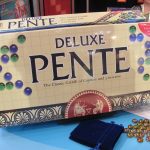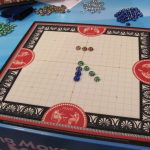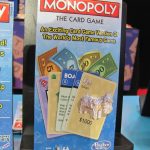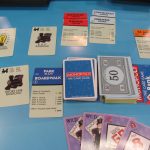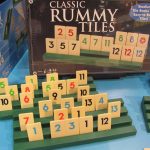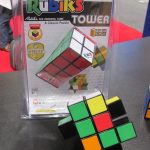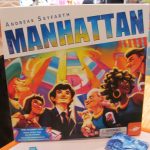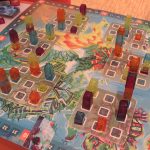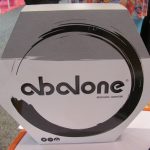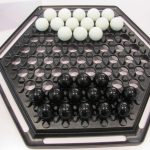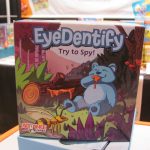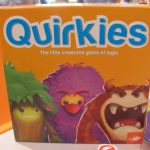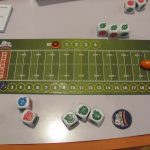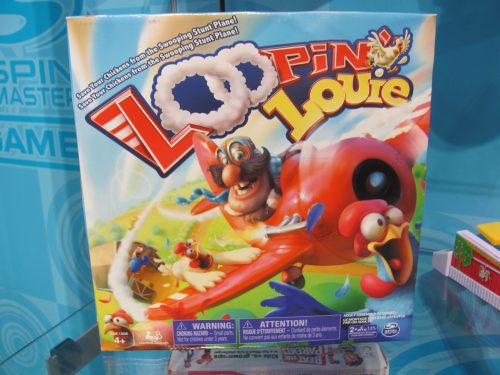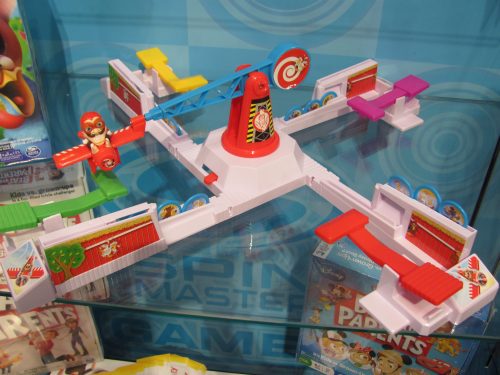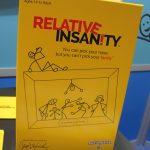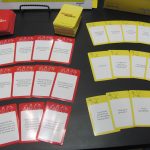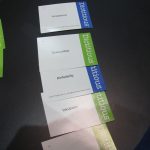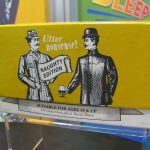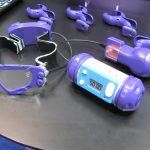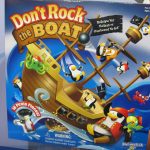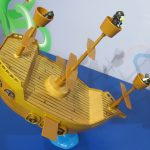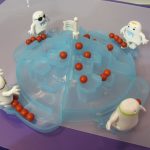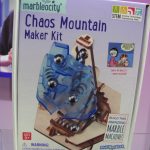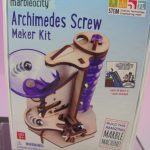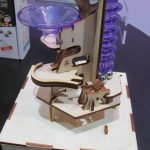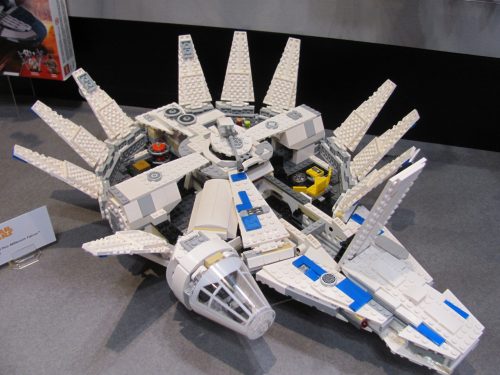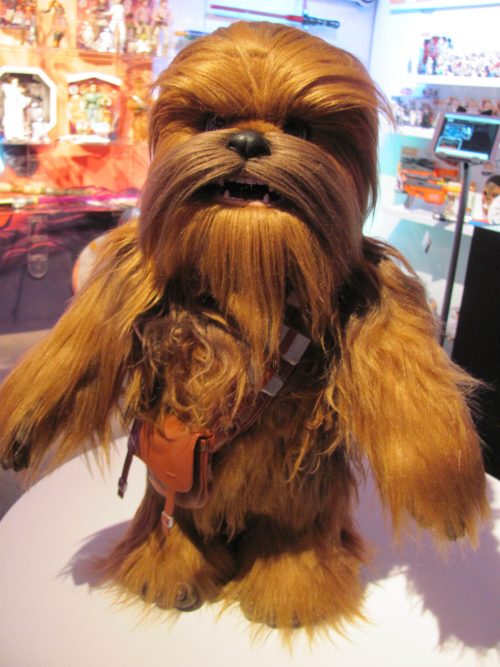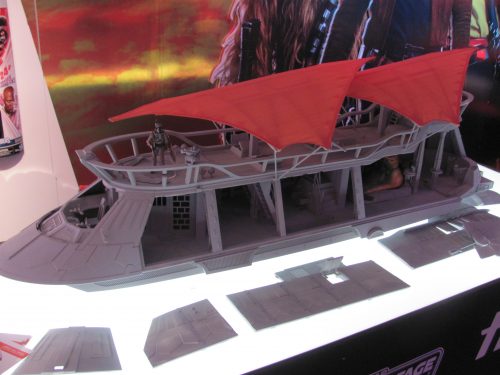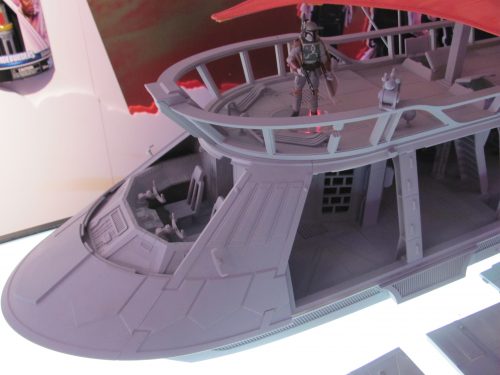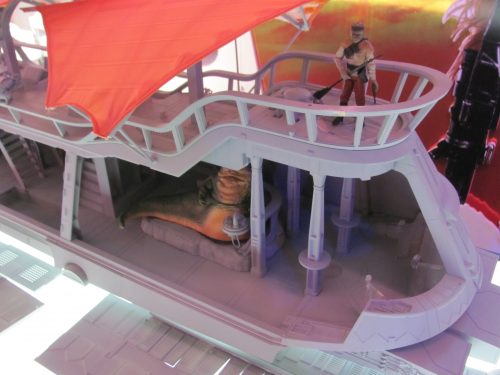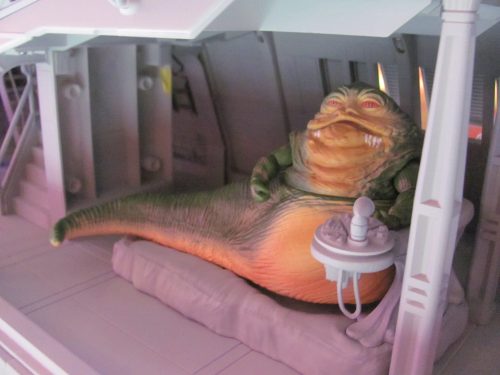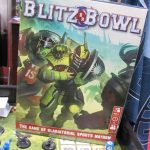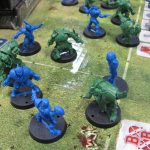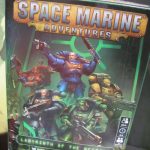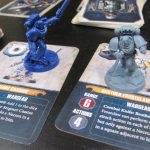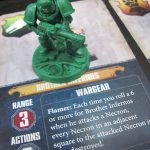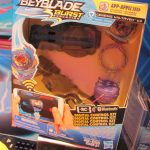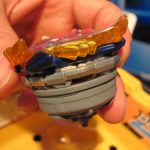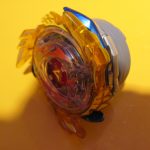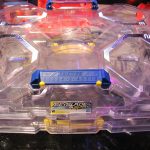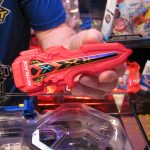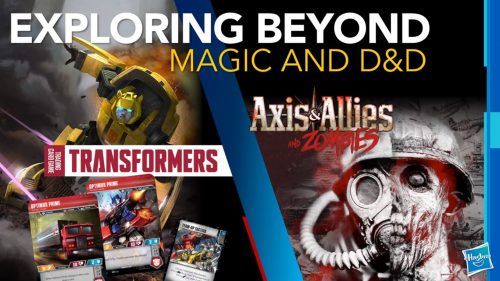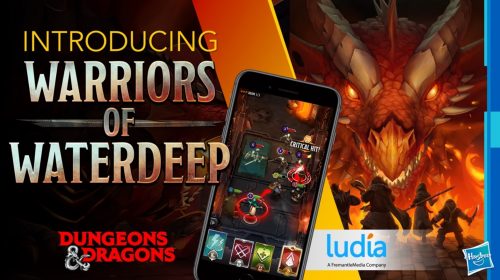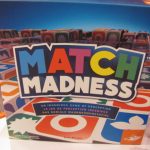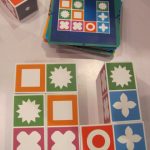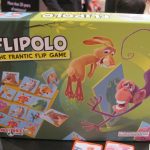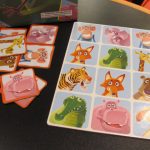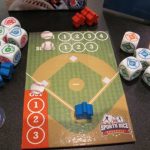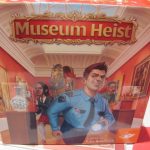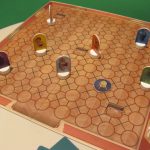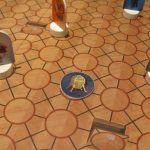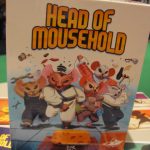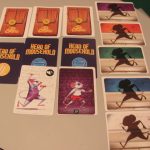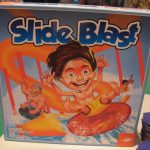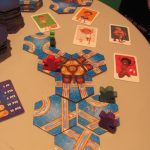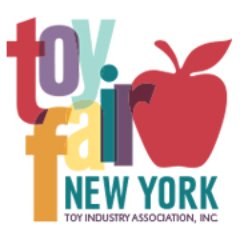 First up on my tour of the Winning Moves Toy Fair booth was a classic brought back to print by the company, Pente ($20 retail, available now). Reminiscent of Go, the goal in Pente is to either line up five in a row of one’s own pieces or capture five pairs of an opponent’s pieces.
First up on my tour of the Winning Moves Toy Fair booth was a classic brought back to print by the company, Pente ($20 retail, available now). Reminiscent of Go, the goal in Pente is to either line up five in a row of one’s own pieces or capture five pairs of an opponent’s pieces.
Next was Monopoly: The Card Game ($11, now). This is neither the same as Monopoly Deal, nor the last Monopoly card game produced by Winning Moves. Instead, it’s more like a cross between Monopoly and Gin Rummy. Players can trade cards but to go out their hand must include at least one complete property color group. Card sets have a dollar value based on the properties in the namesake and the first player to a set dollar amount is the winner.
After that, Winning Moves was showing Classic Rummy Tiles ($15, now). It’s the company’s generic version of Rummikub with stadium-style tile racks.
Finally, there was the new Rubik’s Tower ($17, now) a 2x2x4 non-symmetrical version of the cube puzzle.
 Headlining FoxMind’s new crop of games is Manhattan ($40 retail, available now), a 1994 Spiel des Jahres winner that the company is bringing back to the North American market. The new version is brightly colored with translucent building pieces but plays exactly the same as the original. That is, a hand of cards gives players options for where they can place their buildings. Control of the nine spaces in each of the six cities goes to the player who’s stacked the most building levels there. And points are awarded for controlling the tallest building in each city, the most spaces in each city, and every individual space.
Headlining FoxMind’s new crop of games is Manhattan ($40 retail, available now), a 1994 Spiel des Jahres winner that the company is bringing back to the North American market. The new version is brightly colored with translucent building pieces but plays exactly the same as the original. That is, a hand of cards gives players options for where they can place their buildings. Control of the nine spaces in each of the six cities goes to the player who’s stacked the most building levels there. And points are awarded for controlling the tallest building in each city, the most spaces in each city, and every individual space.
Even older but now with a new board, bigger marbles, and a better box insert is Abalone ($33, now). In this game players use lines of their own marbles to push their opponent’s marbles off the board. Two marbles can push one; three marbles can push two or one.
EyeDentify ($15, June) is a quick-play, spotting game. As each card is turned over, players want to be the first to find something in the displayed picture that matches the shape or color on the back on the next card.
In The Potion ($10, July), players start with two each of three ingredient tokens. Then the dice are rolled for a potion recipe and each player secretly holds out one of the tokens. If when the tokens are revealed the number matches the recipe exactly, then those players can put their tokens in the bottle. The first player able to discard down to one ingredient token is the winner.
Quirkies ($15, June) is a kind-of pattern matching game with cute monster cards. There are nine monsters in a 3 x 3 grid. On each of their turns players must put down a card on a matching monster and if that placement creates three-in-a-row of the same background color or symbol, they score a point. The first to five points is the winner.
Finally, following on last year’s baseball game, FoxMind is releasing this year Sports Dice Football ($12) with similarly simple dice-based gameplay.
- Comments Off on Toy Fair 2018—FoxMind
 Loopin’ Louie, that beloved dexterity game with the airborne chicken-thief, is moving from Hasbro to Spin Master. The new publisher says that gameplay remains exactly the same but Louie’s flying mechanism spins a moderate 15 percent faster to keep up with modern audiences.
Loopin’ Louie, that beloved dexterity game with the airborne chicken-thief, is moving from Hasbro to Spin Master. The new publisher says that gameplay remains exactly the same but Louie’s flying mechanism spins a moderate 15 percent faster to keep up with modern audiences.
Loopin’ Louie from Spin Master will hit retail in August at $20.
- Comments Off on Loopin’ Louie Snatched by Spin Master
 Party games were the focus at Playmonster this year, along with some cute spin-offs of earlier kids games.
Party games were the focus at Playmonster this year, along with some cute spin-offs of earlier kids games.
Relative Insanity ($25 retail, available now) is a party game written by comedian Jeff Foxworthy. It applies the now-familiar structure of one-player-the-judge and applies it to joke writing with 100 Setup cards and 400 Punch Line cards.
In Dictitious ($25, now) everyone votes on player-submitted definitions for fake words.
Utter Nonsense ($25, now), available in Family and Naughty editions, is a game of accents and special voices in the one-player-the-judge, party-game category. These were previously independently published and Target exclusives but were recently acquired by Playmonster [interesting, considering the company also sells Accentuate].
Chrono Bomb! Night Vision ($30, fall) takes the company’s previously released spy-themed activity game of dodging laser security systems (actually strings tied to timers) and adds UV goggles so kids can play in the dark.
Pass the Pup is a combination of hot-potato and action game. Press the dog’s paw to start the music. Whomever is holding the pup when the music stops must do what it says on the next action card.
Already in-print but now getting a refresh is Don’t Rock the Boat ($22, now), a balancing challenge with pirate penguins. In this new version, the individual penguin figures will represent distinct characters and have different weights.
As a follow-up to the absolutely fantastic Yeti in My Spaghetti, this year Playmonster has Yeti, Set, Go! ($22, summer). Each player gets a yeti and by bopping them on the head, kicks meatballs up the mountain. Points are totaled depending on where the meatballs land. Though not a licensed product, expect some cross-promotion with the movie, Smallfoot, scheduled for September.
And finally, not games but still very cool, Playmonster is adding two more machines to the Marbleocity line, Chaos Mountain and Archimedes Screw ($25 each, spring). They can be hand-cranked or motorized and linked to other elements of the series.
- Comments Off on Toy Fair 2018—Playmonster
 Here are a few pictures of Star Wars toys from New York Toy Fair. Not games but I thought you might enjoy them nonetheless, including the Lego Kessel Run Millenium Falcon ($170, April), Hasbro’s Furreal Friends Chewbacca, and the 4 foot long Jabba’s Sail Barge available via HasLab crowdfunding. [Click for even larger images.]
Here are a few pictures of Star Wars toys from New York Toy Fair. Not games but I thought you might enjoy them nonetheless, including the Lego Kessel Run Millenium Falcon ($170, April), Hasbro’s Furreal Friends Chewbacca, and the 4 foot long Jabba’s Sail Barge available via HasLab crowdfunding. [Click for even larger images.]
- Comments Off on Toy Fair 2018—Star Wars Toys
GW’s New Family-Friendly Introductory War Games
23 Feb
Posted by David Miller as Miniatures, Modern Board Games, War Games
 On display by Games Workshop at New York Toy Fair were two new board games representing an effort by the company to provide a fresh point of entry for “the hobby”. The games, which feature less violent language and imagery and somewhat simplified rules, are being promoted to specialty toy retailers and mid-tier mass-market sellers as a way to expose new players to Games Workshop’s most popular IPs.
On display by Games Workshop at New York Toy Fair were two new board games representing an effort by the company to provide a fresh point of entry for “the hobby”. The games, which feature less violent language and imagery and somewhat simplified rules, are being promoted to specialty toy retailers and mid-tier mass-market sellers as a way to expose new players to Games Workshop’s most popular IPs.
Both are planned for release later this year at a price point of around $40-50.
Blitz Bowl is the no-death version of Blood Bowl. It’s still a fantasy, full-contact version of American football, just with less blood and players being “taken out” instead of killed. The concept behind this version is monsters playing a scrimmage game while trying out for the main team.
Blitz Bowl’s rules are streamlined from the original (it’s supposed to play in about 40 minutes). Also, in addition to scoring touchdown’s for the win, completing certain objectives randomly selected each game (for example, three monsters making run actions) unlocks various benefits for the team.
Space Marine Adventures: Labyrinth of the Necrons is a Warhammer 40,000 dungeon crawl with a squad of marines drawn from those troops’ various chapters. The game is cooperative and scenario-based, the first of which is a tutorial and the last of which is a “massive labyrinth adventure” that can be adjusted for difficulty level. Each player gets a plastic space marine figure but the enemy necrons are represented by cardboard tokens.
Inside both game boxes, as alternatives to the standard rule books, are series of cards with instructions that work like game tutorials.
- Comments Off on GW’s New Family-Friendly Introductory War Games
Bluetooth RC Beyblades, Multilevel Stadiums, and Faster Launchers to Debut This Fall
23 Feb
Posted by David Miller as CCGs, Modern Board Games, Other
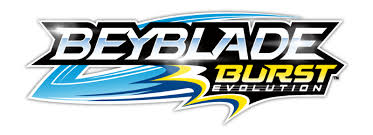
 Following up on its recent launch of the adjustable Beyblade Burst Switchstrike line, Hasbro revealed at New York Toy Fair this week remote control Beys, a multilevel stadium, and the most powerful launcher yet, all to be released in the fall.
Following up on its recent launch of the adjustable Beyblade Burst Switchstrike line, Hasbro revealed at New York Toy Fair this week remote control Beys, a multilevel stadium, and the most powerful launcher yet, all to be released in the fall.
Beyblade Burst Digital Control Kits feature Bluetooth-connected tops that allow players to speed-boost their Beyblades mid-battle, switch spin-direction left or right, and initiate an Avatar Attack accompanied by flashing lights. Included in each kit are a Command Launcher, a Battle Platform, and one remote control Beyblade Burst Top (either Valtryek V3 or Fafnir F3) for $40.
The Beyblade Burst Evolution Switchstrike Battle Tower is a two-level battle stadium for two players on one side and a two-level stadium for four players flipped to the other side. For $50 retail, the tower comes with two tops and two launchers.
And for a 50 percent improvement in launch speeds, there’s the Beyblade Burst Xcalius Sword Launcher. It’s part of the Beyblade Burst Evolution Xcalius Set ($20), as is a right-spin Xcalius X3.
- Comments Off on Bluetooth RC Beyblades, Multilevel Stadiums, and Faster Launchers to Debut This Fall
Power Rangers, D&D, and Other Highlights from Hasbro’s Investor Presentation at Toy Fair
20 Feb
Posted by David Miller as CCGs, Modern Board Games, RPGs
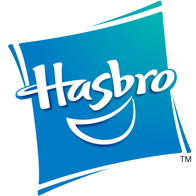 After reporting in its recent financial results an 8 percent revenue growth for the overall gaming category in 2017, Hasbro on Friday said that Dungeons & Dragons sales were up 80 percent. That performance made 2017 the best year for D&D ever.
After reporting in its recent financial results an 8 percent revenue growth for the overall gaming category in 2017, Hasbro on Friday said that Dungeons & Dragons sales were up 80 percent. That performance made 2017 the best year for D&D ever.
A new agreement with Paramount will have Hasbro participating to a greater degree in funding its movie franchises but will also provide more reliable release dates. The Dungeons & Dragons movie is scheduled to hit theaters in 2021.
Star Wars revenue was down in 2017 but Hasbro remains positive about the license, saying the decrease represents a transition to more consistent sales, rather than surges tied to individual movie releases. One of the new Star Wars products that the company is planning for this year is a Furreal Friends Chewbaca.
Citing data from NPD, Hasbro claimed 13 of the top 20 face-to-face games in G10 markets, with Monopoly the number one overall games property.
Online retail accounts for 20 percent of the company’s toy and game sales.
Magic: The Gathering had the best year on record of new player growth.
Hasbro is launching HasLab to “put the power of innovation in the hands of fans.” Actually, HasLab is a crowdfunding platform for premium products not suitable for normal retail channels. The first campaign is for a toy model of Jabba the Hut’s sail barge in the scale of the company’s Star wars Vintage Collection. That makes it over 4 feet long! Five thousand backers at $500 each are required to go to production.
A new Dungeons & Dragons mobile game, Warriors of Waterdeep, is in development by Ludia.
Wizards of the Coast is working on other projects besides just Magic and D&D. The Hasbro subsidiary is developing a Transformers TCG and an Axis & Allies and Zombies board game.
Digital listening is driving development in Hasbro’s gaming category, whether games based on online trends or games designed for online sharing. The company has even put together a “quick strike team” for rapid development and speed to market with social listening.
Hasbro also has weather-targeted games marketing, running additional ads when its raining.
Hasbro sees location-based experiences as a key growth opportunity. This includes live shows, hotels, cruises, and family entertainment centers. Coming soon from Marriott are My Little Pony and Transformers hotels in Shanghai.
The company will launch on Earth Day a partnership with Terracycle to recycle toys and games.
WOTC will soon launch a Magic: The Gathering companion app called Portal, which in addition to a rules reference and life-tracker, will feature a matchmaker of sorts to connect players with new people for face-to-face home games. Netmarble is developing a mobile-to-mobile MtG app.
Hasbro has snagged the master toy license for Power Rangers. Products will begin arriving on shelves in 2019.
- Comments Off on Power Rangers, D&D, and Other Highlights from Hasbro’s Investor Presentation at Toy Fair
Pitch Your Game to Target
10 Jan
Posted by David Miller as Card Games, CCGs, Modern Board Games, Other
 Game and toy inventors hoping to see their design on the shelves of a major retailer have a unique opportunity over the next month with Target. The company has launched what it’s calling the Target Open Innovation Project and is taking applications for direct meetings at New York Toy Fair in February.
Game and toy inventors hoping to see their design on the shelves of a major retailer have a unique opportunity over the next month with Target. The company has launched what it’s calling the Target Open Innovation Project and is taking applications for direct meetings at New York Toy Fair in February.
We want early access to inventors and companies with fresh ideas and in exchange, will offer the opportunity to pitch your idea to a panel of Target Toy buyers and get feedback from experts in Mass Retail. We intend for these meetings to produce a meaningful pipeline of innovation for our Toy Assortment.
Initial applications are due January 17th and require information on the product’s target audience and how it differs from current products. Also asked is whether the inventor has performed any market studies, patent searches, or cost analysis.
Target is looking for products in the following categories: games, dolls, activity sets, pre-school toys, and imaginative play.
- Comments Off on Pitch Your Game to Target
 Fox Mind’s latest release, Match Madness ($30), is a challenge puzzle played in real-time head-to-head. That is, each player has a set of five two-piece blocks covered with various symbols (sort of like three-dimensional dominoes). A challenge card is flipped and the first player to arrange their blocks in a matching pattern wins the point.
Fox Mind’s latest release, Match Madness ($30), is a challenge puzzle played in real-time head-to-head. That is, each player has a set of five two-piece blocks covered with various symbols (sort of like three-dimensional dominoes). A challenge card is flipped and the first player to arrange their blocks in a matching pattern wins the point.
Fox Mind, known mostly in the past for these types of abstract titles, is moving this year to incorporate in to its lineup games with more thematic content.
Flipolo (imminent, $20) is another kind of fast-play race. Every player gets a board of animal faces and a set of double-sided tiles with the same animal faces mixed-and-matched on either side. The goal is to be the first to cover one’s board with matching animals. The challenge is to use the right side of the right tile on the right space, without needing the opposite side of the tile in a different space.
Sports Dice Baseball (May, $12) is a light dice game for two players. When a meeple comes up to bat, both players roll a set of dice. For each, the most common roll (single, double, etc.) governs. If the roll of the one at-bat is better, the hit is a success. If the roll of the player fielding is better, then the batter is out. Ties can be broken by the player currently holding the power chip, if they hand the chip over to their opponent.
Museum Heist (summer, $30) secretly assigns players individual art-thief characters. Then they take turns moving character tokens around the museum map-board (any, not just their own). The goal is to be the first to arrive at an art token and steal it without being discovered.
The concept for Head of Mousehold (summer, $20) is based on the saying, “The second mouse gets the cheese.” That is, after determining a new speed ranking each round for the various colored mice, players lay mouse cards (alternating face-down and face-up) on the cheese-baited mouse traps. At the end of a round, when everyone has placed their three mouse cards, the one who played the second-fastest mouse on each trap gets to claim the cheese.
Slide Blast (summer, $30) is a tile-laying path game along the lines of Tsuro or Psyche Paths. Starting from a central hub, players add hexagonal tiles to build out an elaborate water-slide. They rack up points for every segment that their token slides, as well as bonus points for slides they assist other players.
- Comments Off on Toy Fair 2017—Fox Mind
Trending
- Massdrop.com
- Oh the Irony—Illuminati Card Game Continues to Inspire Conspiracy Theorists
- Home
- Footprints, an Educational Ecology Game
- USPS Adds Board Game Flat Rate Box
- Baila, the Estonian Drinking Card Game
- Crystal Caste Wins Dice Patent Suit Against Hasbro
- Mirror Game, Red and Blue
- Are Board Games Dangerous?
- The Truth About Dominoes On Sunday in Alabama
Archives
Most Popular Articles
- Oh the Irony—Illuminati Card Game Continues to Inspire Conspiracy Theorists
- The 20 Most Valuable Vintage Board Games
- The Truth About Dominoes On Sunday in Alabama
- Sequence Game, and Variants
- USPS Adds Board Game Flat Rate Box
- Baila, the Estonian Drinking Card Game
- The 13 Most Popular Dice Games
- Are Board Games Dangerous?
- Guess Who? The Naked Version
- What Happened to the Jewel Royale Chess Set?
Recent Posts
- Toy Fair 2019—Breaking Games
- Talisman Kingdom Hearts Edition
- Toy Fair 2019—Winning Moves
- Toy Fair 2019—Games Workshop
- Toy Fair 2019—Star Wars Lightsaber Academy
- Toy Fair 2019—Stranger Things Games
- Toy Fair 2019—HABA
- Licensing Roundup
- Game Bandit
- 2018 A Difficult Year For Hasbro But Not For D&D Or MtG
Recent Comments
- on Toy Fair 2019—Winning Moves
- on Game Bandit
- on Second Look—Dungeons & Dragons Waterdeep Dragon Heist
- on Crowdfunding Highlights
- on Beyblade SlingShock
- on Game Bandit
- on Game Bandit
- on Watch This Game!, the Board Game Review Board Game
- on Second Look—Vampire: The Masquerade 5th Edition
- on Palladium Books Loses Robotech IP License, Cancels Five-Year-Overdue Robotech RPG Tactics Kickstarter

